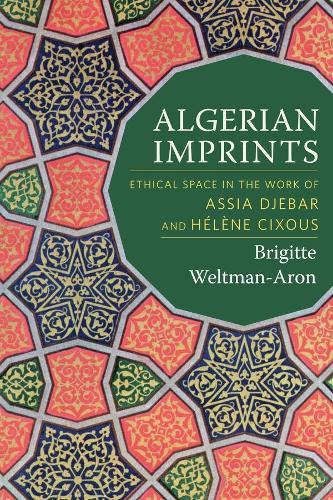Full Product Details
Author: Brigitte Weltman-Aron (University of Florida)
Publisher: Columbia University Press
Imprint: Columbia University Press
Dimensions:
Width: 15.20cm
, Height: 2.30cm
, Length: 22.90cm
Weight: 0.454kg
ISBN: 9780231172561
ISBN 10: 0231172567
Pages: 232
Publication Date: 18 August 2015
Audience:
College/higher education
,
Undergraduate
,
Postgraduate, Research & Scholarly
Format: Hardback
Publisher's Status: Active
Availability: Manufactured on demand

We will order this item for you from a manufactured on demand supplier.
Language: English
Reviews
The advantage of Algerian Imprints is that it activates and animates the texts of two important contemporary female Francophone authors in favor of serious reflections concerning their corporeal and scriptural 'origins,' relations to language, questions of testimony and hospitality, and the sexual politics of resistance. This is a book that many, both scholars and students, will want to read. -- David Wills, Brown University Compellingly argued, Algerian Imprints brings together in novel ways two leading francophone writers, H l ne Cixous and Assia Djebar. Working at the intersection of literature, history, and theory, Brigitte Weltman-Aron shows convincingly how these women write from their marginal positions to create a politics of dissensus -- Verena Conley, Harvard University Brilliantly argued and beautifully written, Algerian Imprints is a powerful and daring book that provides a radical rethinking of the work of two major writers. Weltman-Aron's subtle and minutely detailed analysis helps us reconfigure and conceptualize the concepts that are at the heart of their aesthetics and political views. This book is the first to unravel the complex relationships that Cixous and Djebar have developed between body and language, writing and gender, and, above all, the connections between literary theory and the history of postcolonial relations between Algeria and France. -- R da Bensma a, Brown University
The advantage of Algerian Imprints is that it activates and animates the texts of two important contemporary female Francophone authors in favor of serious reflections concerning their corporeal and scriptural origins, relations to language, questions of testimony and hospitality, and the sexual politics of resistance. This is a book that many, both scholars and students, will want to read. -- David Wills, Brown University Compellingly argued, Algerian Imprints brings together in novel ways two leading francophone writers, H l ne Cixous and Assia Djebar. Working at the intersection of literature, history and theory, Brigitte Weltman-Aron shows convincingly how these women write from their marginal positions to create a politics of dissensus. -- Verena Conley, Harvard University Brilliantly argued and beautifully written, Brigitte Weltman-Aron's Algerian Imprints is a powerful and daring book that provides a radical rethinking of the work of two major writers : Assia Djebar and H l ne Cixous. Brigitte's subtle and minutely detailed analysis of their novels and critical essays help us to reconfigure and conceptualize the concepts which are at the heart of their aesthetics and political views. No previous book has been able to show with such precision and accuracy the encounter between these two writers and the impact their work had on Feminist theory and postcolonial theory. Brigitte Weltman's book is the first to unravel the complex relationships that these two writers have developed between body and language, writing and gender, and, above all, the connections between literary theory an the history of postcolonial relations between Algeria and France. At a time France is facing an unprecedented rise of anti-Semitism and xenophobia, the attention this book devotes to the history of colonial education, the trace (in Djebar's oeuvre) or hospitality (in Cixous's) makes this book a starting point for readers who are interested in postcolonial France. -- R da Bensma a, Brown University
The advantage of Algerian Imprints is that it activates and animates the texts of two important contemporary female Francophone authors in favor of serious reflections concerning their corporeal and scriptural origins, relations to language, questions of testimony and hospitality, and the sexual politics of resistance. This is a book that many, both scholars and students, will want to read. -- David Wills, Brown University Compellingly argued, Algerian Imprints brings together in novel ways two leading francophone writers, H l ne Cixous and Assia Djebar. Working at the intersection of literature, history and theory, Brigitte Weltman-Aron shows convincingly how these women write from their marginal positions to create a politics of dissensus. -- Verena Conley, Harvard University
The advantage of Algerian Imprints is that it activates and animates the texts of two important contemporary female Francophone authors in favor of serious reflections concerning their corporeal and scriptural origins, relations to language, questions of testimony and hospitality, and the sexual politics of resistance. This is a book that many, both scholars and students, will want to read. -- David Wills, Brown University
The advantage of Algerian Imprints is that it activates and animates the texts of two important contemporary French female authors in favor of serious reflections concerning their corporeal and scriptural origins, relations to language, questions of testimony and hospitality, and the sexual politics of resistance. This is a book that many, both scholars and students, will want to read. -- David Wills, Brown University
Author Information
Brigitte Weltman-Aron is associate professor of French at the University of Florida and the author of On Other Grounds: Landscape Gardening and Nationalism in Eighteenth-Century England and France.




